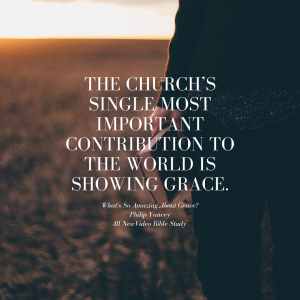Jesus reserved some of his harshest words for the Pharisees, and that used to puzzle me. They were, after all, the most “spiritual” people of his time. They studied the Bible, and strove to keep every one of the 613 laws in the Old Testament. They truly were “holier than thou.”
As I studied Jesus’ complaints about the Pharisees, two stand out. First, by focusing on the small things, they missed the big things. Pharisees actually tithed their kitchen spices—salt, pepper, cinnamon, 10% or each goes to God—yet they ignored big things like poverty and injustice. They were so strict about honoring the Sabbath that they reacted with fury when Jesus healed a person on the Sabbath. They cared more about rules than people.
Second, Pharisees congratulated themselves on how strict they were, and viewed themselves as morally superior to other people. They were blind to their own pride.
As the story in John 8 shows, Jesus had a different kind of vision than most people. The teachers of the law and the Pharisees looked at the world around them and saw two kinds of people: good people—like us—and bad people—like that wayward woman who committed adultery. Jesus looked at the same scene and saw two kinds of people: those in need of God’s grace who know it—like the terrified woman—and those in need of God’s grace who don’t realize it—like the pious religious leaders who were condemning her.
 In this newly filmed six-session video Bible study, bestselling author Philip Yancey explores the concept of grace—something the world cannot duplicate and the one thing it craves above all else—and illustrates what it looks like in action.
In this newly filmed six-session video Bible study, bestselling author Philip Yancey explores the concept of grace—something the world cannot duplicate and the one thing it craves above all else—and illustrates what it looks like in action.
You see, grace is a gift from God. It comes to us free of charge, no strings attached. By definition we can’t do anything to earn it or deserve it. But to receive a gift, you must have open hands. Often it’s the moral people, the religious people, who have their hands closed tight in a fist. I’m OK. I keep the law. I’m better than 90% of the people around me. For them, the gift of grace falls to the ground, unreceived.
As I mention in the book, the church I attended when I lived in Chicago actually housed two “churches.” Upstairs, a traditional congregation met. Downstairs, on Tuesday nights, we let an Alcoholics Anonymous group meet. I accompanied a friend of mine to the downstairs church a few times, and was struck by the power of their radical honesty. “Hi, I’m Bob, and I’m an alcoholic.” “Hi, I’m Sarah, and I’m a cocaine addict.” The 12-step program requires that they admit their wrongs—and if they try to fudge, well, fellow addicts are the best lie detectors I know.
 One day I asked my friend Bob if he’d ever thought about visiting the upstairs church some Sunday. A look of alarm crossed his face. “Oh, I’d never go there!” he said. “Those people have their lives together. They dress so well, they have jobs, they show up on time. We’re just a bunch of alcoholics. We smoke cigarettes, drink coffee, and try to keep each other from falling apart.”
One day I asked my friend Bob if he’d ever thought about visiting the upstairs church some Sunday. A look of alarm crossed his face. “Oh, I’d never go there!” he said. “Those people have their lives together. They dress so well, they have jobs, they show up on time. We’re just a bunch of alcoholics. We smoke cigarettes, drink coffee, and try to keep each other from falling apart.”
How sad that Bob saw church as a place for people who have everything together. Somehow we Christians can give off those vibes, when actually we gather in church because we know we’ve failed, and we need God’s grace and forgiveness. Like the downstairs church, we need a Higher Power that only comes from God and from the supportive community around us. God can only work with us when we admit our need. We must have open hands.
To many people, Christians have the reputation of being holier than thou, whereas the true measure should be less holy than Thou. As I study Jesus’ life, I notice a pattern. He pushes high the ideals of what kind of people we should be. At the same time, he offers a safety net of grace.
For example, in the Sermon on the Mount Jesus raises the ideals so high that none of us can reach them. So I’ve not committed adultery—have I ever lusted? I’ve not committed murder—have I ever hated? Do I love my enemies? Do I give to everyone who asks? “Be perfect, as your father in heaven is perfect,” Jesus says.
That sounds absolutely hopeless, right? Yet in the same sermon, Jesus lowers the safety net of grace. In his life Jesus proved that no one need fall below the reach of God’s grace. Not this adulterous woman in the temple. Not even a prostitute—like the one who anointed his feet with perfume. Not a thief—like the one on the cross. Not a terrorist—like his own disciple Simon the Zealot. And not a traitor—like his disciple Peter. Indeed, Peter the traitor and Paul the human rights abuser, both now forgiven and transformed, proceeded to lead the way in spreading the gospel of grace.
 So, we see Jesus raising the ideals and simultaneously lowering the safety net of grace. Sadly, his followers may take the opposite approach. Some churches gradually lower the ideals, by accommodating moral standards to a changing culture. We used to think this behavior is wrong, now we don’t. Others raise the bar of grace so that needy people feel unwelcome: “We don’t want that kind of person in our church. They’re offensive. They upset the donors.” Either way, we fail to communicate the spectacular good news that everyone fails—and yet a gracious God extends forgiveness to all who ask.
So, we see Jesus raising the ideals and simultaneously lowering the safety net of grace. Sadly, his followers may take the opposite approach. Some churches gradually lower the ideals, by accommodating moral standards to a changing culture. We used to think this behavior is wrong, now we don’t. Others raise the bar of grace so that needy people feel unwelcome: “We don’t want that kind of person in our church. They’re offensive. They upset the donors.” Either way, we fail to communicate the spectacular good news that everyone fails—and yet a gracious God extends forgiveness to all who ask.
 Philip Yancey has written twelve Gold Medallion Award–winning books and won two ECPA Book of the Year awards for What’s So Amazing About Grace? and The Jesus I Never Knew. Four of his books have sold over one million copies. He lives with his wife in Colorado. Learn more at philipyancey.com
Philip Yancey has written twelve Gold Medallion Award–winning books and won two ECPA Book of the Year awards for What’s So Amazing About Grace? and The Jesus I Never Knew. Four of his books have sold over one million copies. He lives with his wife in Colorado. Learn more at philipyancey.com


